The site of the demolished structure the day after the violence.
COMMENT
On Saturday morning, the air is crisp as I stand at the site of a demolished structure in Hangberg, Hout Bay. A man is dismantling sheets of corrugated iron loosely attached to broken poles, while another is pulling nails out of damaged planks of wood. Torn sheets of plastic are blowing in the wind and children are playing in the sand beside the demolished structure.
The night before, June 19, I had been standing in almost the exact same spot, but the scene had been very different. Tear gas had filled the air along with rubber bullets and rocks. Moments before I had seen about 40 law enforcement vehicles from the City of Cape Town pull into the harbour and officers in bulletproof vests stream out of them to demolish an illegal structure. The night had erupted into violence between residents and the police. The roads had been barricaded with burning bins, two buildings were on fire and Casspirs had been sent to force calm on the area.
“I was so scared that my stomach was turning. I felt so helpless,” said Shadé Daizy, a resident of Hangberg.
She says it was her brother’s house that had been demolished. The structure, considered illegal by the City of Cape Town because he didn’t have approval to build on that piece of land, had been up for only a week. It was one of the structures that had been knocked down on June 11 after a demolition order was issued by the city. A violent incident had ensued in which police tear gassed the school and fired rounds of rubber bullets.
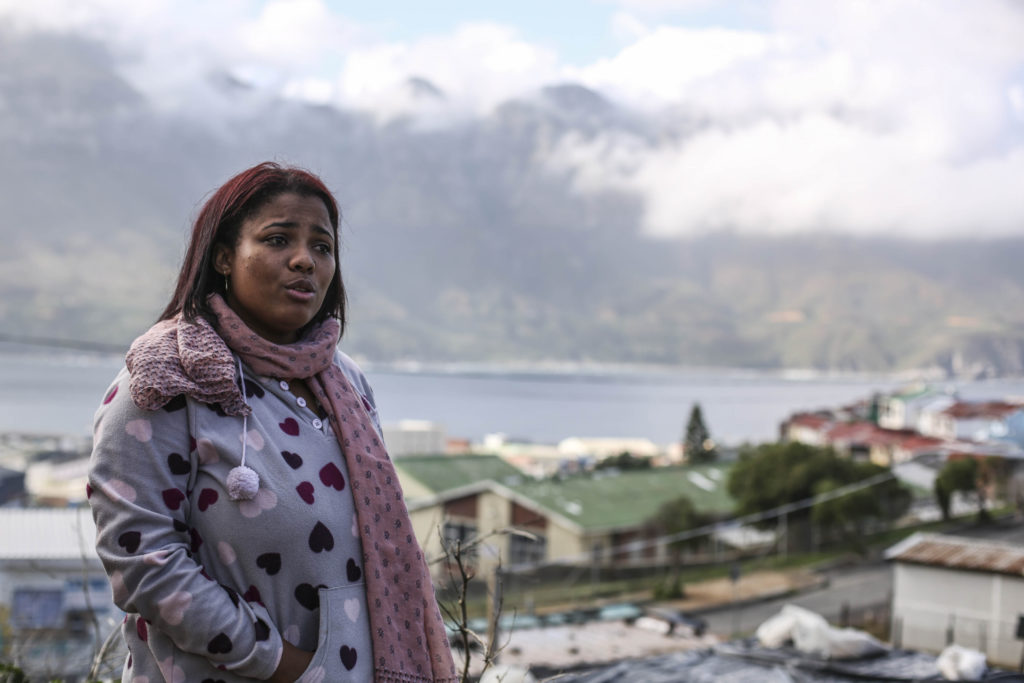 Shadé Daizy shares her story on site, saying how she was ‘sick to her stomach’ when the police moved in to destroy her brother’s house.
Shadé Daizy shares her story on site, saying how she was ‘sick to her stomach’ when the police moved in to destroy her brother’s house.
“When the police arrived [on June 19] they said they were just checking to see if the structure was occupied, which it was. There was even a child inside playing video games. We thought everything was fine because they didn’t have any documents and they said they wouldn’t do anything. But then they came back 10 minutes later and started tearing everything down,” Daizy says.
The problem of housing has been a long-standing issue in Hangberg. The forced removals during apartheid had caused a scaring emotional wound and access to decent housing has been problematic ever since. This came to a head in 2010 during the Battle of Hangberg when, after a series of forced evictions on the slope of Sentinel Mountain, a fight erupted between the residents and the city. In response, the Hangberg Peace Accord was signed and the courts mandated that housing be developed on specific plots of land. But the Peace Accord swiftly fell apart and there has been almost no formal housing development, apart from one block of flats, in the past 10 years. This failure has been the cause of several violent protests over the years.
“We don’t want to fight, but what else can we do?” asks Daizy.
“When I saw the military come in, I was furious. Why is it there are no police available when a rape happens, or a murder happens? We call the police station and are told there are no vehicles, no officers available. But then they send this amount of force for one structure? If they just invested this energy in the community instead of the police, we wouldn’t have these problems. The police are just legal gangsters.”
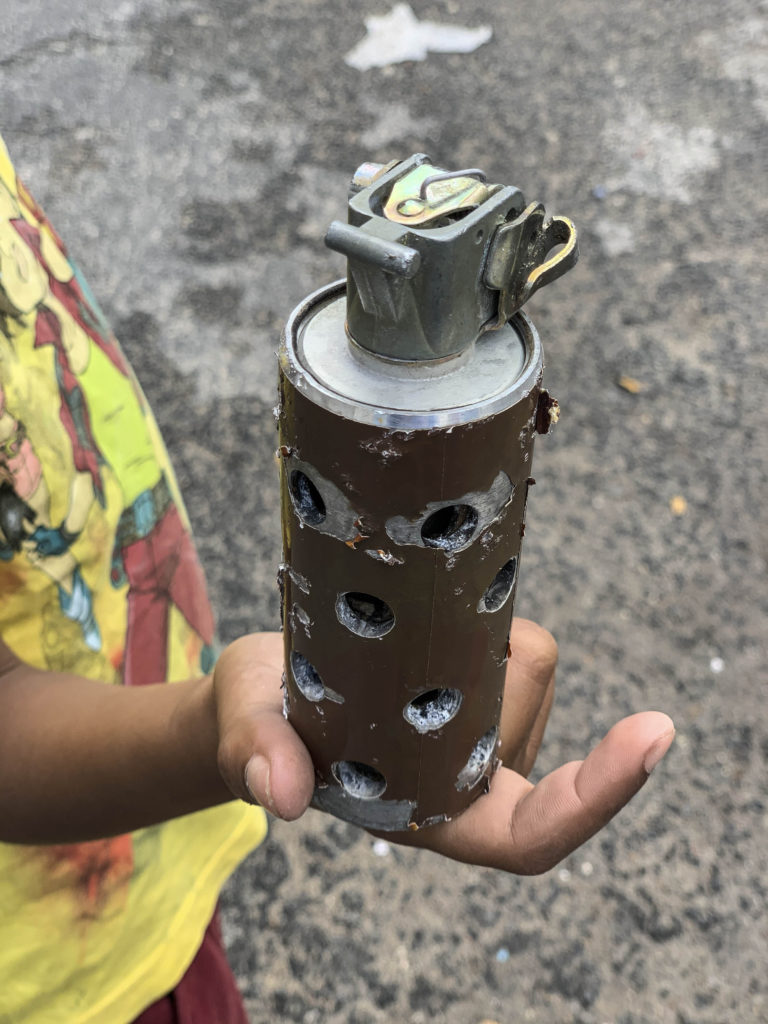 A young boy holds a teargas canister he found on the street.
A young boy holds a teargas canister he found on the street.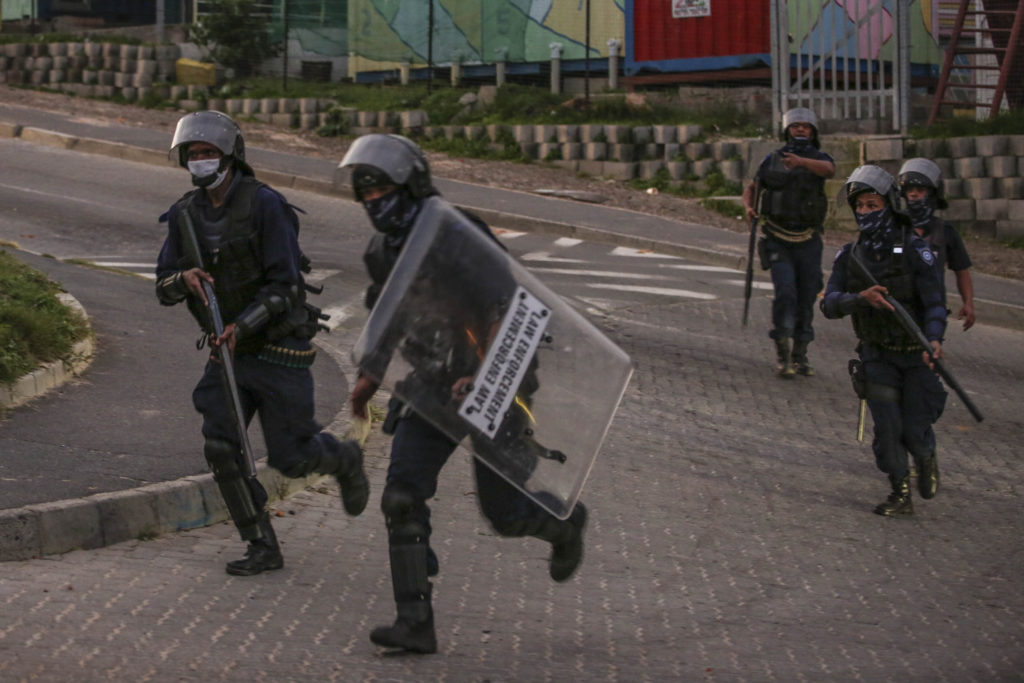 Law enforcement officers run through the streets as violence escalates after a single ‘illegal’ structure is demolished.
Law enforcement officers run through the streets as violence escalates after a single ‘illegal’ structure is demolished.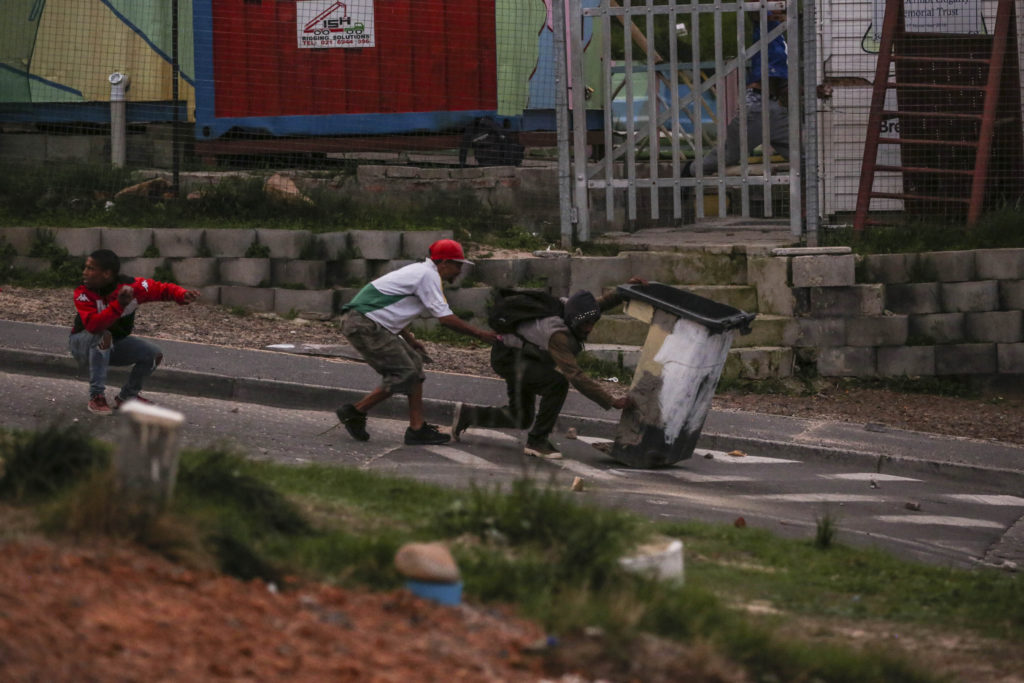 Residents hide behind a small barricade after violence breaks out.
Residents hide behind a small barricade after violence breaks out. A police vehicle drives into Hangberg at the start of the unrest.
A police vehicle drives into Hangberg at the start of the unrest.
Listening to her, it’s hard not to make the connection between the global movement of #BlackLivesMatter and the campaign to #DefundThePolice. This is exactly what the movement is advocating for.
“What if they put these resources into the youth? What kind of a community would we have then?” asks Daizy.
As if on cue, two boys walk up to me holding an empty teargas canister they found on the road and a girl in the background pretends to shoot her friend with a toy gun. The effect the on-going violence has on the children cannot be overstated. People are desperate for social services.
It is also true that in the chaos of June 19, a crèche was burned to the ground, one of the few social institutions in Hangberg. Many people ask why, in the wake of such need, would people destroy the limited resources they have? But the issue is complex, with some feeling there are different standards for different people, depending on what political party you are affiliated with.
“Almost all the houses here are classified as illegal,” says one resident. “It’s just that some are more illegal than others. It all depends on whether you support the city. Some people can have their houses made legal if they report on other illegal structures. This is how the city divides and conquers within the community.”
Although much of the anger is directed towards the Democratic Alliance, which governs the Western Cape, I can’t help but think that “divide and conquer” is a common tactic for all political parties. The ANC causes division by blaming their corruption and greed on the ills of apartheid, shirking off responsibility for poor governance and service delivery over the past 26 years. The Economic Freedom Fighters party causes division by returning to racial tensions. The DA seems to have chosen the path of class division, systematically implementing gentrification across the city and dismissing the needs of the poor.
Where is the leadership that unites, that brings people together to create a better society for everyone? All I can see are the broken shards of our post-apartheid dreams, scattered among the ashes of social inequality and injustice.
Admittedly, the city is in a difficult position. In the wake of the Covid-19 pandemic, no evictions are allowed to take place, but the number of illegal houses has been increasing rapidly. The city cannot demolish structures considered to be occupied, but it also cannot let illegal structures to be erected on land allocated for different purposes. This problem would have been averted if they had just built the houses in the first place.
While we are standing on the site of the demolished structure, several Hangberg leaders arrive with representatives from the Peace and Justice Witnesses, part of a coalition of churches and Christian organisations, and a representative from the South African Human Rights Commission.
Lee Smith, a local activist, says the city has broken the “gentleman’s agreement” made at the end of 2019 in which Hangberg residents agreed that no protests would take place so long as no demolitions were done by the city. He believes the city violated this agreement when it demolished structures and people’s response was warranted.
“Crime is subjective,” Smith says. “Under apartheid, being coloured was a crime but that has changed. Now building a house for your family is considered a crime. But isn’t it more of a crime to destroy someone’s home?”
The Human Rights Commission representative says that his role is to remain neutral and objective, systematically identifying the facts. He does this carefully, allowing everyone to have their say. Much of the anger seems directed at the local ward councillor, but the commission representative reminds them the councillor is not a representative of the city and, instead, it is the other way round — his role is to represent the residents.
While local leaders insist the city has broken their legal contract with the Hangberg community, the commission representative cautions that legal processes are difficult, especially for under-resourced Hangberg. He suggests that they need to find a way of meeting halfway.
“Why must we meet halfway,” asks Smith, “when it is us who suffer through this brutality, who have been waiting for houses and service delivery for decades? Why should we meet with them halfway when they are shooting teargas into our schools and firing rubber bullets into our streets?”
“It’s called taking the higher ground,” the commission representative responds.
And therein lies the challenge — that those who have suffered the greatest injustice are also the ones expected to have the moral dignity and stamina to take the higher ground. I find myself thinking back to Nelson Mandela’s response at the end of apartheid; how, despite all the cruelty, oppression and injustice, his focus was on reconciliation and not retribution, on creating the new South Africa. But this feels almost impossible now.
Daizy takes me to her mother’s house, a small two-bedroom apartment in a block of flats nearby. She says that it’s easy to look at the chaos from the night before and to write it off as the Hangberg community being difficult, but it’s important to understand the reasons behind this, to understand the conditions under which people live.
Her mother has been in this apartment for 28 years, working hard to make a home for her family. Eight people live here and every corner is filled — two couches are in front of a small TV screen and a small table is pressed into the corner. Window and door frames lean against the wall and you have to step over two bags of cement to get through. The next room is filled with a double bed and a bunk bed with three mattresses stacked on top. There is a pile of folded blankets and a basket of laundry on the bed.
Daizy says that every night the house is rearranged: the mattresses are put on the living room floor, followed by a discussion about who gets the bed, the mattress or the couch for the night. In the morning, everything is rearranged again.
“We are packed in here like sardines,” says Daizy. “We all just want our little place in the sun.”
Although the home is modest and it’s difficult to imagine how eight people share such a small space, it’s also hard not to think that they have it better than many. Here there is electricity, running water, a solid structure and a stack of blankets to keep out the winter cold. Just 500m up the road the landscape is different, with informal structures made from wood and corrugated iron balanced precariously on the mountain slope, sheets of plastic draped over the structures to keep out the winter rains.
Outside, the streets are alive with activity. A shopkeeper passes sweets to eager hands through a small opening, a woman hangs laundry on a washing line in front of a parked car with a cracked window, and a man stands reading the newspaper as a small dog eats scraps of food from a heap of rubbish.
As I begin to leave, more people arrive to tell their story. There are so many unheard voices here and it seems everyone wants to speak.
“We are tired,” says one woman. “We are tired of being silenced. We are tired of this constant sense of desolation. Where am I supposed to go? What am I supposed to do?”
A man adds: “I’ve been waiting for a house for 25 years and I am still living hand to mouth. I was part of the underground movement during apartheid and lately I’ve been thinking we need to start that again. It feels like there’s no other way to go.”
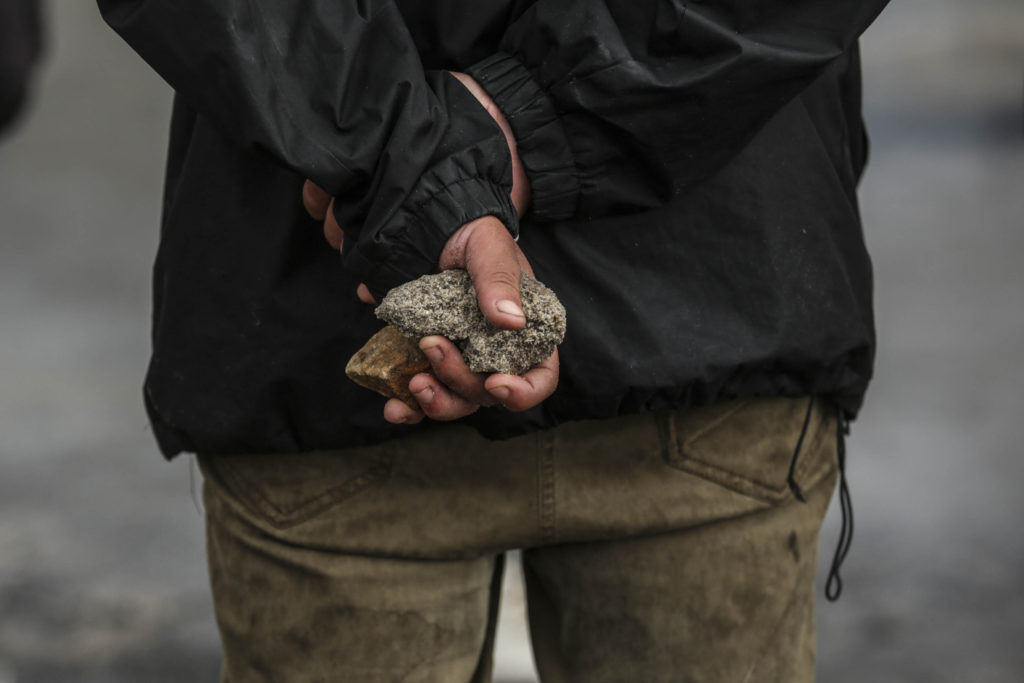 A resident stands with rocks in his hand.
A resident stands with rocks in his hand.
Another woman says the housing issue affects every aspect of life, and fuels other problems such gender-based violence. “When your house is destroyed over and over again you feel powerless. People have to express their power somehow and so they pick on the weakest because it’s the only thing they have. This is the systemic violence that people don’t speak about. Our community is traumatised.”
It is believed that a further 28 structures are set to be demolished. Of all the choices the elected representatives of the people have before them in the execution of their duties, it’s hard to believe they have chosen this — to demolish hope and deepen despair.
As I walk away, one woman’s comment stays with me.
“My mother has been sleeping on the floor for 30 years. All she wants is a little bit of respect.”
Kiara Worth is completing her PhD in political science, is a freelance writer and photographer working predominantly with the United Nations and lives in Hout Bay, near Hangberg. For more photos and videos from this story, visit www.kiaraworth.com